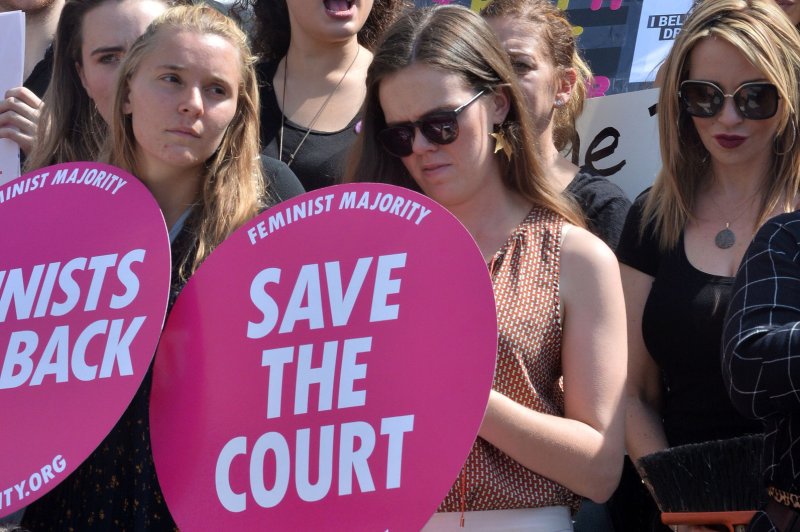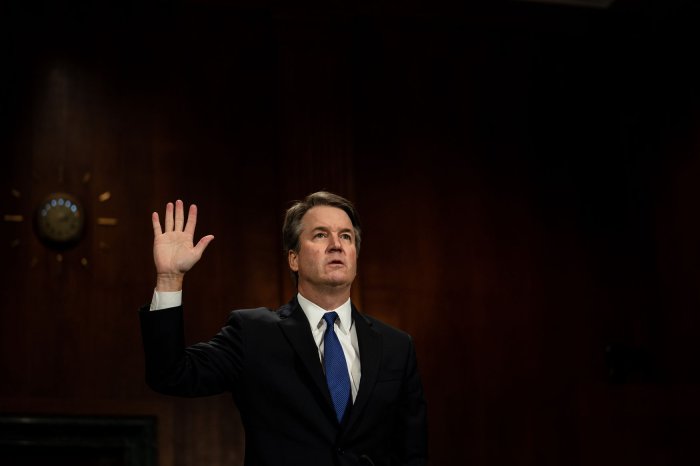Oct. 5 (UPI) -- Political grandstanding during the nomination of a new U.S. Supreme Court justice is perhaps to be expected in the era of Donald Trump. But the process surrounding Brett Kavanaugh -- and his testimony on Sept. 28 -- has caused potentially irreparable damage to the one branch of government often considered to be a bastion of stability and independence in Washington, D.C.
The accusations of sexual assault against Kavanaugh made by Christine Blasey Ford -- albeit so far unproven -- are shocking and rightly became the subject of an FBI investigation. President Donald Trump then added fuel to the fire by publicly mocking her. But the Democratic Party's obstructionist tactics and its injection of politics into the hearings have played their own part in damaging the integrity of the highest court in the land.
While it has become an expectation for party politics to be front and center of a Supreme Court hearing, and there have always been politically charged nominations, this has been a particularly partisan case. After the initial Kavanaugh hearings between Sept. 4 and 7, Justice Ruth Bader Ginsburg criticized the process, saying: "The way it was was right. The way it is is wrong." Ginsburg was alluding to an earlier time when the bipartisan confirmation of judges was more common, and Democrats and Republicans often came together to elect the best candidate for the job.
Related
Such a bipartisan system better reflects the universal interpretation of what a judge represents: an heir to a tradition of decision making that emphasizes independence, accountability, individuality and self-limitation. Despite the corruption and partisan battles that have unfolded in the chambers of Congress and the White House, generations of Americans have been comforted by the fact that the Supreme Court transcended these political tendencies.
The political playbook
But the two main parties arguably have increasingly framed nominations as key political talking points for swaying voters. Trump used this tactic in his 2016 campaign message after Republicans held out for nearly a year against President Barack Obama's court nominee Merrick Garland in the hope that they would indeed take the White House and install in the court a candidate of their own.
And so with Kavanaugh's nomination, the job fell to the Democratic Party to push back. In a tense political atmosphere, the Democrats attempted to not only derail his nomination, but also make it a party political contest.
Republican Sen. Lindsey Graham recently noted of Kavanaugh: "Had he been nominated in another era, he would have likely received 90-plus votes." (The Senate comprises 100 senators. To have 90 senators would most certainly be a landslide and represent wide bipartisan approval.) Indeed, in a judicial sense, Kavanaugh's positions would be considered to be typical of a run-of-the-mill conservative. Attempts to paint him otherwise are misleading, particularly when Trump had several more conservative judges on his list, such as the devout Catholic Amy Barrett.
Despite this, Senate Minority Leader Chuck Schumer clarified his position before Kavanaugh had uttered a word of testimony: "I'm going to fight this nomination with everything I've got." The reckless rhetoric that followed culminated in Democrat Sen. Corey Booker chastizing supporters of Kavanaugh as being "complicit in evil," adding "there is no neutral." And this was on July 24, long before Ford gave her testimony in late September.
During the initial hearings for Kavanaugh, Booker used his seven minutes of questions to discuss topics such as Trump and racial issues. And the number of questions Booker asked about Kavanaugh's previous case opinions or jurisprudence? Zero. Given that the historical purpose of such hearings is to debate legal philosophy and identify how the nominee interprets the law, many would argue that he was a long way off piste.
Kavanaugh's testimony
This political grandstanding was summarized in Kavanaugh's follow-up testimony in response to Ford's allegations of sexual assault, in which he described the entire saga as a "circus." And in that sense, he was right.
Ford's letter to Sen. Dianne Feinstein -- in which she first described her allegations -- had been held in confidence (initially at Ford's request) for six weeks since it was first received by the senator on July 30. It was only leaked (by persons unknown) and reported on (initially by The Intercept) in September, when the Senate's vote on Kavanaugh was imminent. There is absolutely no doubt that Ford's allegations are serious, and that her claims should be taken extremely seriously. But the Republicans have suggested that the timing of their public airing is a political move.
Nonetheless, even in such unprecedented circumstances, Kavanaugh's explosive political rhetoric was a game changer for the image of judging. While the average approval rating of the U.S. Congress among the American public stands at 18 percent more should be expected of a Supreme Court nominee.
Included in Kavanaugh's testimony were accusations of "apparent pent-up anger about President Trump's" election, "revenge on behalf of the Clintons," and "millions of dollars in money from outside left-wing opposition groups." Such language from a Supreme Court nominee is unprecedented.
In 1991, the response of George H.W. Bush nominee Clarence Thomas, in the face of accusations from Anita Hill -- a law professor who had worked under Thomas at the Department of Education -- became infamous for accusing members of the Judiciary Committee for questioning "uppity blacks who in any way deign to think for themselves." But he never reached for the explicit political language used by Kavanaugh.
In comparison, Trump's first nominee for the court in 2017, Neil Gorsuch, faced wave after wave of questions from Democrats. But his plain, vanilla platitudes about his duty to protect the Constitution and interpret the law in a politically neutral way saw him do his part to maintain the independent image of the judge.
Kavanaugh's failure to do so, however, has seen over 1,000 law professors sign a letter criticizing his testimony. It read:
"We have differing views about the other qualifications of Judge Kavanaugh. But we are united, as professors of law and scholars of judicial institutions, in believing that Judge Kavanaugh did not display the impartiality and judicial temperament requisite to sit on the highest court of our land."
Whether or not Kavanaugh is appointed to the Supreme Court, the damage from this drawn-out saga has been done. On a personal level, Kavanaugh's credentials for the Supreme Court are now placed into great doubt. And on an institutional level, the longstanding, historical notion of the judge -- as an independent, non-partisan interpreter of the law, rather than a political member of a super-legislature -- may never truly recover.![]()
Jak Allen is a PhD candidate in the School of History at the University of Kent.
This article is republished from The Conversation under a Creative Commons license. Read the original article.
Brett Kavanaugh, Christine Blasey Ford testify in Senate
















